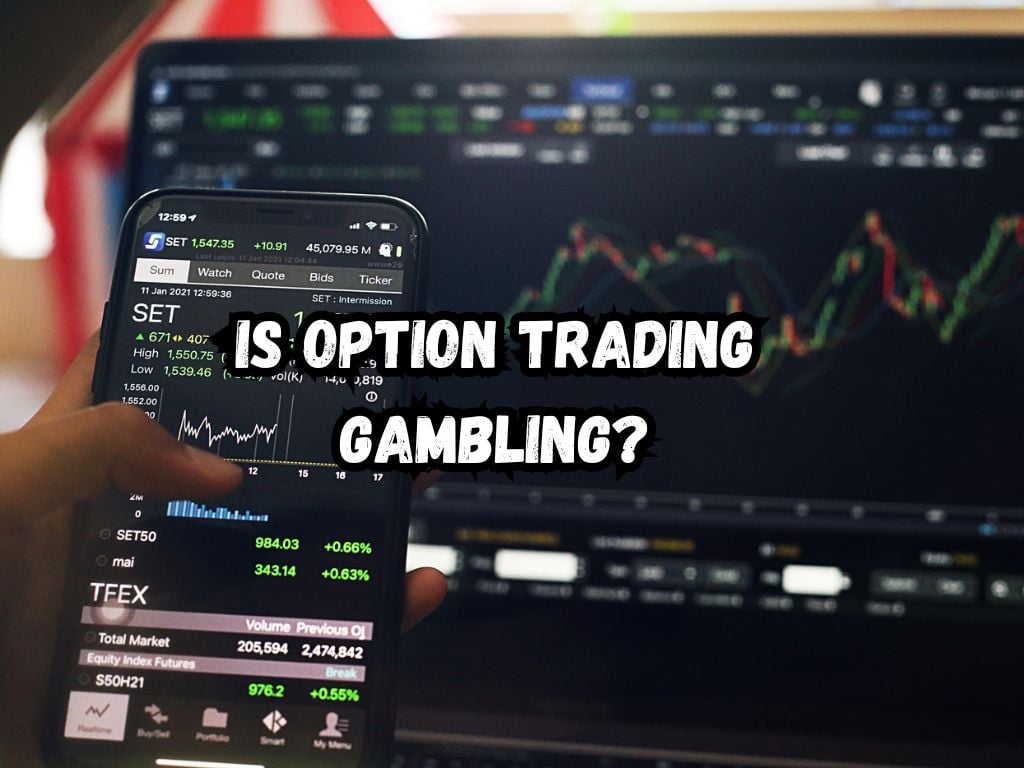In the vast world of finance, option trading stands out as a topic of intense debate. Is option trading gambling disguised in the cloak of a sophisticated financial instrument?
Or is it a strategic play in the market that, when understood and managed properly, can lead to significant gains?
This article aims to explore these questions by delving into the specifics of option trading, comparing it to gambling, and weighing both perspectives.
Is Option Trading Gambling?
Option trading involves contracts that give the holder the right, but not the obligation, to buy (call options) or sell (put options) a stock at a predetermined price before a specific date.
Unlike purchasing stocks outright, option trading allows for leveraging a position for a fraction of the stock’s price. This basic principle underlines the appeal of option trading – the potential for high returns with a limited investment.

Unraveling Similarities with Gambling
At first glance, option trading shares some similarities with gambling:
- Inherent Risks and Rewards: Both domains promise high returns, often with significant risk.
- Element of Chance: Success in both fields can seem heavily reliant on unpredictable future events.
- Psychological Appeal: The thrill of making a quick profit is a common lure in both gambling and option trading.
Delineating Key Differences
However, critical differences set option trading apart from gambling:
- Analysis and Strategy: Successful option traders use in-depth market analysis and have strategic approaches. They study trends, company performance, and economic indicators, which is a far cry from pure speculation.
- Risk Management: Option traders have tools and strategies at their disposal to manage risks, such as stop-loss orders and diversification.
- Regulatory Aspect: Option trading is regulated by financial authorities, providing a legal and structured framework for market participants.
Perspectives Supporting the Gambling View
Critics argue that the volatile nature of markets makes option trading akin to gambling. The argument centers around the unpredictability of market movements and the high percentage of options that expire worthless.
The reliance on speculation, where a significant portion of success depends on chance events, further blurs the lines between investing and betting.
Arguments Advocating Strategic Investment
Conversely, many defend option trading as a disciplined form of investing. This viewpoint highlights the role of analytical research and the strategic use of options to hedge against market downturns.
Unlike gambling, where outcomes rest solely on chance, option trading decisions are based on informed analyses, financial theories, and market indicators. Education and experience play crucial roles in separating successful option traders from gamblers.
The Future of Options Trading
The future of options trading appears poised for significant evolution, marked by technological advancements and changing regulations.
Here are key trends anticipated to shape the landscape of options trading:
Integration of Artificial Intelligence (AI) and Machine Learning (ML):
- AI and ML are set to revolutionize how market analysis and predictions are made, offering unprecedented accuracy and speed.
- These technologies will enable the custom tailoring of trading strategies to individual risk profiles and investment goals, enhancing personalized trading experiences.
Automated Trading Systems:
- The adoption of automated, algorithm-based trading systems will increase, facilitating the execution of complex strategies that can adapt to market changes in real-time.
- This automation will reduce human error and emotional decision-making, potentially increasing profitability.

Enhanced Risk Management Tools:
- Advanced risk assessment algorithms will emerge, employing vast datasets to better predict market volatility and guide options trading decisions.
- Traders will have access to more sophisticated tools for managing and mitigating risk, aligning with individual tolerance levels.
Expanding Regulatory Framework:
- As technology advances, regulatory bodies will adapt, possibly introducing new guidelines to ensure the market’s integrity and protect investors from systemic risks.
- Transparency and fairness in AI-driven decision-making will become focal points, necessitating clear regulatory standards.
Education and Accessibility:
- With the democratization of trading through technology, there will be a surge in educational resources and platforms aimed at empowering retail investors.
- This trend will help bridge the knowledge gap, making options trading more accessible to a wider audience.
In conclusion, the integration of AI and ML, alongside evolving regulatory frameworks, will not only change how trades are executed but also how markets are analyzed and understood.
These advancements promise to make options trading more efficient, accessible, and tailored to individual investor needs.
Frequently Asked Questions
Can you make consistent profits with option trading?
While profits are never guaranteed, skilled traders who employ rigorous research and risk management strategies can achieve consistent returns over time.
How can I minimize risk in option trading?
Diversifying your portfolio, setting stop-loss orders, and limiting the portion of your capital allocated to options are effective risk management strategies.
What are the best strategies for beginners in option trading?
Starting with simple call and put options can help beginners understand basic concepts. It’s also advisable to practice with a simulation platform before investing real money.
Conclusion
The debate on whether option trading is akin to gambling is complex and nuanced. While similarities in risk and reward exist, a deep dive into the mechanics, regulations, and strategies of option trading reveals a practice that is more rooted in strategic analysis than in chance.
Like any financial endeavor, success in option trading depends on the individual’s dedication to learning, continuous market analysis, and disciplined risk management.
Option trading is not a venture to be taken lightly or approached with a gambler’s mentality. It requires an understanding of the markets, a strategic plan, and, above all, a disciplined approach to managing investments and risks.
By fostering education and a comprehensive understanding of this instrument, traders can navigate the complexities of the market more effectively, making informed decisions that align with their financial goals.


 Tags:
Tags:










